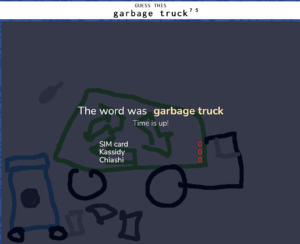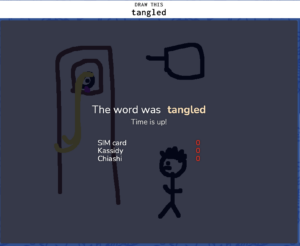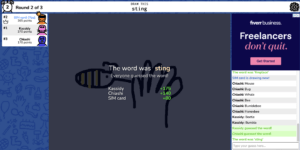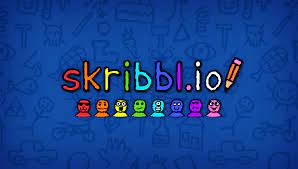skribbl.io is a multiplayer drawing and guessing game. It was created and published by ticedev on the website Crazy Games. It is suitable for players of ages 8+ and targets friends and families at social gatherings. For my critical play, I played skribbl.io on my laptop with two of my siblings while we were on FaceTime.
skribbl.io requires judging through its main mechanics of drawing and guessing, and this can cause friendly tension within the group. For instance, when it is a player’s turn to draw, they must judge their own drawing abilities and pick the word they believe they can draw best. Additionally, players must judge their own drawing as they are completing it. In doing so, players can ensure their drawing is easily deciphered, so they gain points as well.
The mechanic of drawing and the judging that occurs during a player’s turn can create two different dynamics. The first dynamic is creativity, which usually occurs when players judge their skills correctly and get to choose a word they can draw well. On the other hand, if players were dealt difficult word choices and have judged that their word is beyond their drawing abilities, it creates a dynamic of pressure. Not only will they not gain any points if no other players can guess the corresponding word, but there is a timer. Although the timer is not visible in the game, the knowledge of the timer creates a sense of urgency and puts time pressure on players. Typically, if the former dynamic emerges, the players are supportive of the drawer. However, if the second dynamic is present, then players tend to become opinionated and hostile. This causes banter to occur, and it heightens the feeling of pressure, as well as evokes other emotions like impatience.

As an example, during my game of skribbl.io, one of the players constantly reminded the group by saying, “Hurry, you’re running out of time!” Other players would hastily respond with, “Stop, I know!” This further emphasized the dynamic of pressure and contributed to the tension within the players.
skribbl.io also requires judging during the mechanic of guessing. Players use their judgment, along with the clues about how many words and letters are within each word, to guess what is being drawn. If players judge correctly or partially correctly, they get points. Likewise, players can also share their judgment about the drawing by liking or disliking it.
Oftentimes, during my gameplay experience, players made comments like, “What is that?” and “You should’ve drawn a movie symbol, so we know it’s not the character in the movie.” These comments can help the person that is drawing adapt their future drawings, but if players make these comments with a judgmental tone, it exacerbates the tension between them.

The mechanic of guessing and the judgment of drawings creates a dynamic of information sharing. Players want to convey their word correctly by sharing information through their drawings. During my time playing this game, we also created a rule to not write words on the drawing. This added a layer of complexity when it came time to draw the word, and further reinforced the significance of conveying the information about the word well.
Altogether, the dynamics of creativity, pressure, and information sharing result in the aesthetics of sensation, challenge, and fellowship. I had never played skribbl.io before, but after I played it with my siblings, one of them shared that they love playing it, so they can watch others draw. This demonstrates the aesthetic of sensation, in which players may enjoy the visual component behind drawing and watching drawings be done. Moreover, the core of skribble.io is the player versus player format. This contributed to the aesthetic of challenge, since players had to overcome the curve of drawing under a time constraint and getting the most points in order to win. Finally, the aesthetic of fellowship emerges as players realize that even though they want to get the most points, they can also get points by drawing well. This encourages players to not sabotage other players by making a bad drawing. Instead, players are incentivized to draw their best, so that they can also get points when other players guess correctly.

Throughout my gameplay experience, I had to judge both during my own drawing round and while guessing what other players drew. In spite of this, since I played skribbl.io with my siblings, we were comfortable bickering and making otherwise rude comments to one another. This created friendly tension, and we were able to resume our relationships like normal after the game ended. But if players are not comfortable with one another, it may create a different gameplay experience and affect group dynamics and relationships differently.



